How to Learn Java As Quickly As Possible: Best Practices to Adopt
Students who start to learn Java and other programming languages often wonder if there are any tips and tricks that will quicken the learning process. I am not sure about tricks in terms of studying, but there are a few handy tips to make the process as quick as it is realistically possible.
Join the DZone community and get the full member experience.
Join For FreeBased on my experience in tutoring and software development, I’ve put together the seven most applicable and proven recommendations for learning Java quickly. So, stay tuned to find out what they are.
Top 7 Tips and Tricks to Make the Process of Learning Java Easier and Faster
1. Find a Java Project You Want to Build After Honing Java Coding Skills
Brian Knapp, an experienced programmer and the author of Code Career Genius blog has a nice starting tip for all students wondering how to learn Java quickly. He suggests finding a project you can build as soon as you become confident in your knowledge and skills. The red line here is to make sure the project really excites you, so you can finish your training.
See how that happened with Brian:
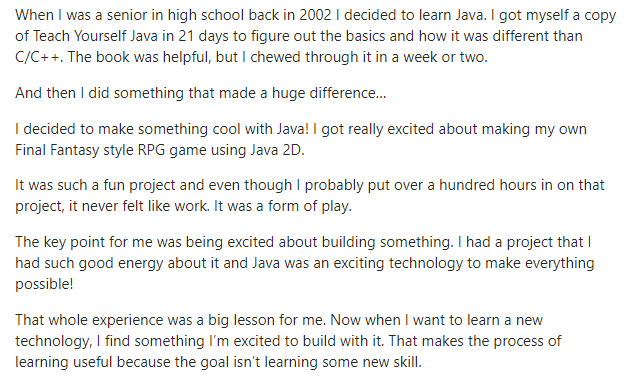
Brian makes a good point — finding a fun and exciting Java project you want to build in the end will keep you motivated to learn the language and do it without taking a break.
As soon as you gain way more knowledge, say, learn at least Java syntax, OOP concept, and collections, it makes sense to think about building your own small project, like:
Games: Clone of Mine Picker, Hungry Snake, 2048, Flappy-Bird Game. Even Super Mario Bros clone is possible to try (for more or less advanced students)
School / Sports / Recipe / Inventory / Library Management System
Billing System
Currency Converter
Banking Application, etc.
2. Keep Up Practicing on a Regular Basis
Regular, repeated practice is a key to becoming a professional, highly-experienced Java programmer. Sure, reading books is also important in the learning process, but without being supported by hands-on experience, it doesn’t make all the difference.
So, to start practicing, you need a certain tool for code. The programs depend on the programming language of your choice — e.g., writing Java code requires that you use Intellij IDEA. This is the program that allows you to do simple tasks, code programs, and then share them with other specialists who can give you feedback on your code.
You should also consider training platforms for programmers of any skill level. A few of the best online Java courses include CodeGym, CodeChef, Codewars, and CodinGame. Go have a look at them.
CodeGym
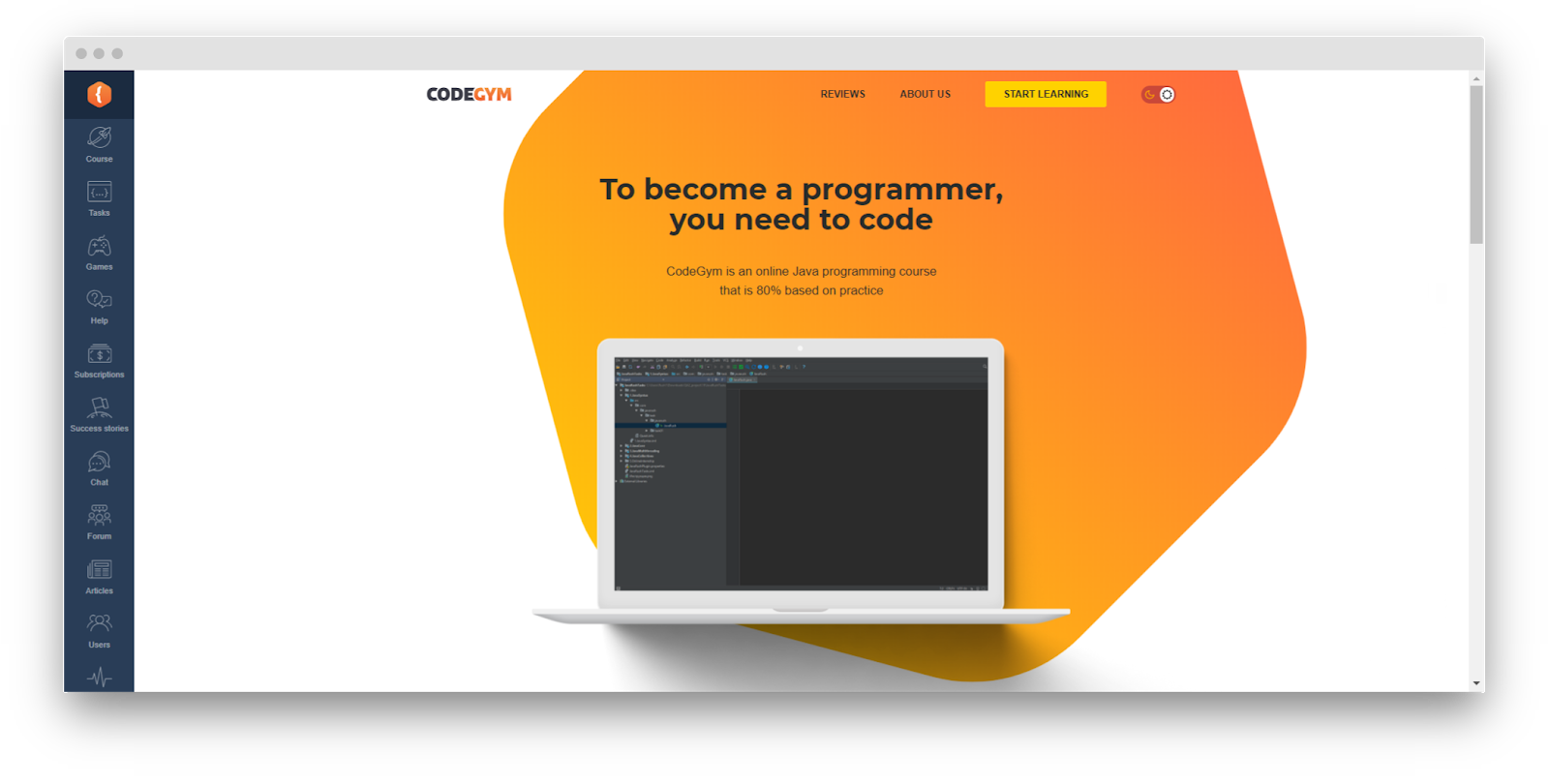
CodeGym is developed to teach you the Java programming language. It is 80% based on practice and contains 1200 hands-on tasks of increasing complexity that will help you acquire the skills needed to get a job. As the platform is equipped with an online validator, you can get your solutions verified right away and see your progress upon finishing the challenge. Additionally, the course uses the latest teaching methods, including gamification, storytelling, visualization, to keep you motivated to learn Java.
CodeChef

Learning to program by competing with the other developers is another unique way to teach yourself to code. CodeChef is a platform that hosts contests three times a month and makes it possible for you to challenge yourself on writing the code and even win prizes for that. Other than taking part in various contests, you can also join training sessions and discussions related to algorithms, binary search, and other concepts.
Codewars
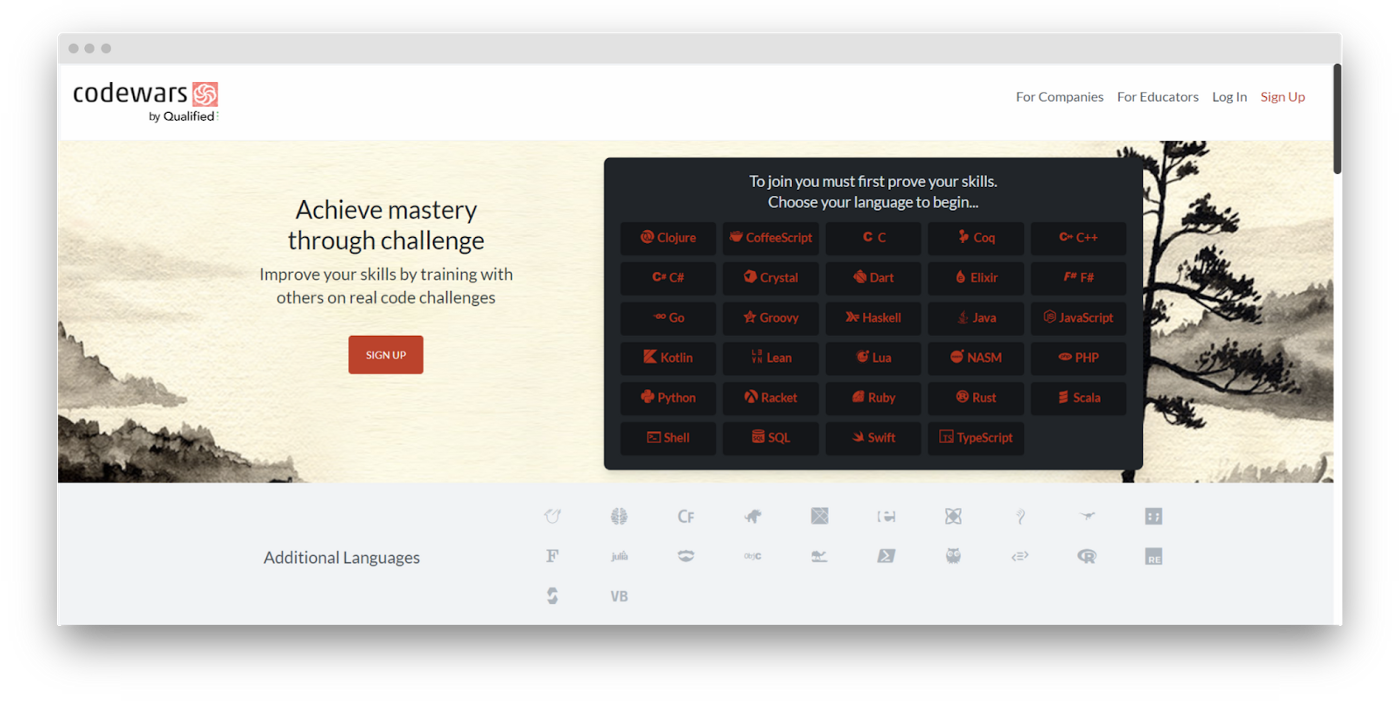
Codewars platform has been created by its users to give other learners another source for practicing code challenges called kata. Codewars platform supports 20 programming languages; 12 more are available in beta version yet. Training on kata allows teaching various techniques and hone already acquired knowledge. Upon passing the challenge, the students get constructive feedback from the experienced community members. During the training, they progress through the ranks and earn honor.
CodinGame
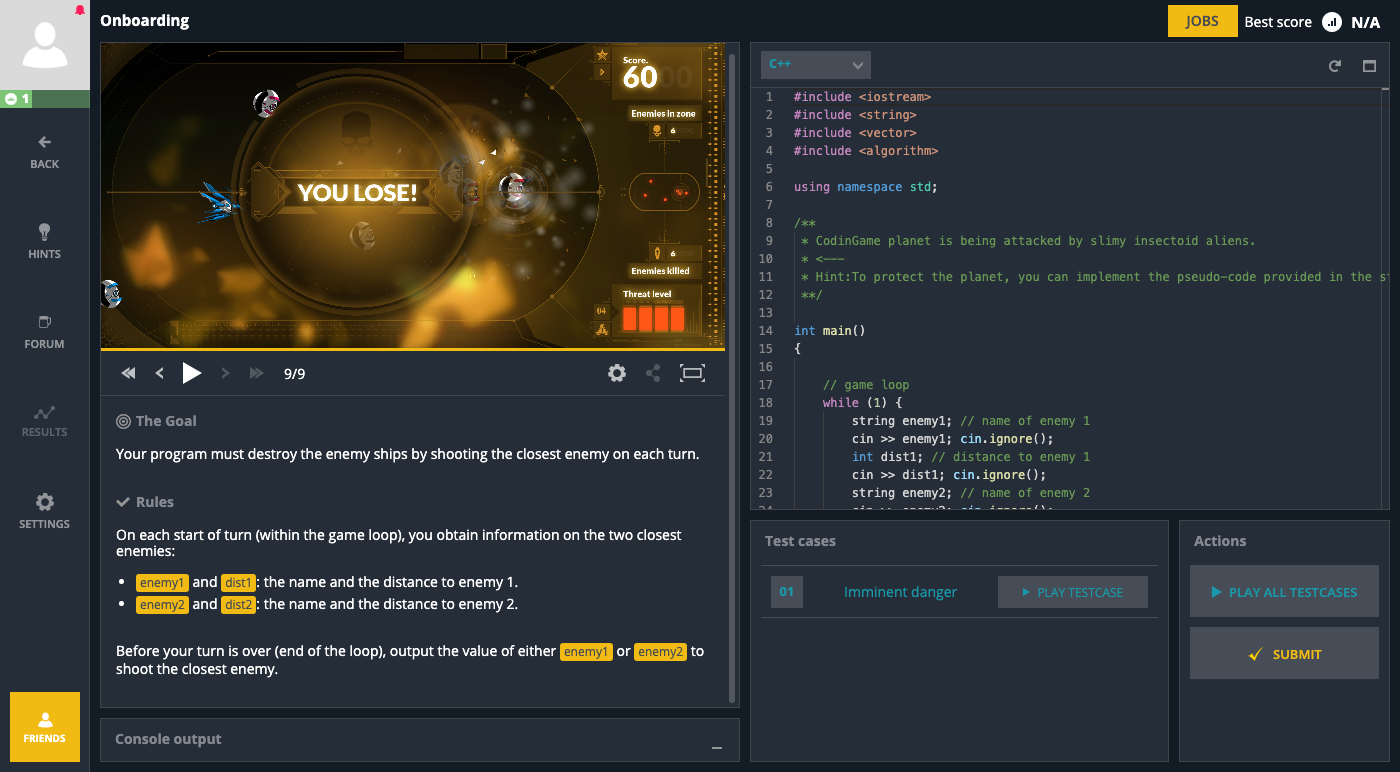
You won’t get bored at CodinGame — there are lots of challenges to come through from solving programming puzzles to participating in programming competitions. The tasks vary depending on programmers’ skill level, so both complete beginners and experienced coders can find matching challenges. When taking part in contests, you are encouraged to write AI bots and compete against the bots of your fellow programmers. Users who learn programming on the go will make the most of a 5-minute coding battle in Clash of Code.
3. Avoid Taking Long Breaks While Studying
While watching my former students, I came up with an idea that training should be regular and continuous without breaks longer than a day. This is a tip to follow if you want to progress really quickly and complete the course without leaving it halfway through.
Other than that, taking breaks sometimes forces people to refresh their memory or even start learning to program from the very beginning since the human brain tends to forget new information quickly. So my recommendation is to set aside some time every day to learn Java and hone your knowledge with hands-on tasks and challenges.
4. Connect With Other Newcomers and Fresh Learners
The community of programmers is found to be one of the most supportive and friendly in comparison to other spheres. Therefore, students collaborate and combine the efforts supporting each other more often than others. This makes it possible for independent learners to succeed.
To become a part of a community, you can join any programming-related forum. This is the place, at which you can find a mentor who will guide you. But, if it is out of the question yet, you can always turn to experienced specialists, ask them for help, or at least get feedback on your code. Professionals on the forums are glad to help complete newbies, thereby making their own brain actively work.
Here’s a list of the forums you can join:
Reddit channels
r/programming
r/learnprogramming
r/codetogether
r/programmingtools
r/gamedev
r/prograrticles
r/webdev
r/dailyprogrammer
r/java
r/javahelp
Slack channels
Hashtag Developers, a community of developers from the whole world on Slack.
European Dev Explorer, a community of devs who live and work in different European cities and share their experience in this regard.
DevOps Chat, community, where devs of all backgrounds talk about code, create projects, discuss development, and support other specialists to make them feel welcome.
StackOverflow is one of the most popular communities for devs from the whole world. It helps to find answers to coding questions, share knowledge, and land a dream job.
SitePoint is another well-known community that allows learning to code and even finding a job.
5. Read Someone Else’s Code
The web is full of open-source projects that allow looking into other developers’ thinking — reading someone else’s code gives you a better understanding of how it generally works.
So, consider different resources, such as GitHub, GitLab, or SourceForge to take a closer look at other developers’ solutions. Analyzing others’ examples will help you find your own problem-solving approach and practice coding differently. This is a perfect way to teach yourself to code when you are a newbie.
6. Set Aside Low Expectations
Another general recommendation is not to belittle your capacity when you just start teaching yourself to code. To make it clearer, people often think they are too old, too nontechnical-minded, too hopeless to acquire programming skills. Even specialists in their late twenties believe they are too old to start learning to code. Let’s face it: “being too old” is rather an excuse to quit than a real problem. But, you’ll never know until you try. Think about it.
See what Brian Lim, an experienced Java developer, says about 30-year-old students who are to start learning Java programming.
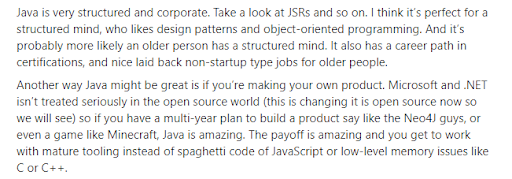
7. Consider Coding by Hand
You may find this practice odd, but I would say code handwriting remains one of the best exercises for novice developers. Other than honing your skills, coding by hand also lets you land a job. The thing is that taking college exams or passing technical interviews require that you hand write the code to prove your hard skills. The so-called ‘pencil code’ will also let you understand if you have deep knowledge of structure and syntax and close knowledge gaps if you have them.
Do you still find this practice old-fashioned?
Closing Words
Let’s face it: we all want to end up things we just start to learn as quickly as possible. Learning to program is no exception. And since learning programming is not a fast process and requires that you put time and effort into, some useful tips will make it a little easier and faster. Finding an exciting Java project to build on your own, practicing on a regular basis, collaborating with other specialists, reading someone else’s code are the practices worth adopting and following. Other than that, keep on learning something new every single day and don’t give up. All of this will lead you to success.
Opinions expressed by DZone contributors are their own.

Comments